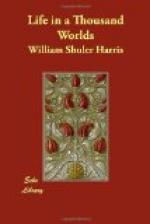I was then a royal guest, and passed a most felicitous night with these four celebrities. We talked of the more powerful telescope that the government of Jupiter was manufacturing, and of the still greater views it promised to reveal.
Then I informed them of our system of science. They were astonished at the great civilization extant on Zo-ide, or our Earth.
I told them that a subtile power lay dormant in the atoms and molecules of matter, which could be released and utilized, and that we in our world called it “electricity.”
During the night I learned that the convolutions on the chin and forehead of a Jupiterite served the purpose of a new sense. By the aid of these convolutions any person of Jupiter can tell in daylight or darkness the nature of any surrounding substance, whether it be hard or soft, combustible or non-combustible, good for food or not. I confess that I was unable to grasp the idea intelligently. So the people on the Moon had the same difficulty in understanding the use of my nose.
Before morning dawned I informed my appreciative quartette that I would see them no more, that I had paused at Jupiter station long enough, and that I must be off on my vast excursion trip.
They earnestly entreated me to remain so that the college students and representative persons could get a glimpse of me; but I refused all their entreaties. When they found that I had power to leave them instantly, they besought me to remain for a few last words.
“Shall we not see you again?” affectingly asked the astronomer.
I told them that I expected to spend eternity in the kingdom of our God who made all the stars and worlds, and holds each in its respective place. “If you are pure in heart to Him,” I continued, “there can be no doubt but that we shall see one another again in that happy celestial center where our eyes will be our telescopes, where our pure hearts will assent to the Fatherhood of God, and where our souls will be quickened at the universal fountain of Love.”
CHAPTER V.
Beautiful Saturn.
A delightfully busy world next met my gaze. Saturn, supreme in love, with its mysterious rings and its eight moons, now held my attention and won my admiration.
This world is almost as large as Jupiter, and its soil is more fertile. The inhabitants resemble us in physical appearance, except that they are twice our size.
Like Jupiter, it is enveloped in thick semi-liquid clouds which are never at rest. This changing atmosphere causes continual friction of particles, and this serves to produce sufficient heat to counteract the frigid blasts that would otherwise freeze out the whole planet. These atmospheric conditions attracted my attention to a great degree. I estimated as best I could, and ascertained that Saturn receives as much heat from this peculiar atmosphere as our Earth receives from the Sun.




